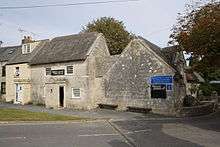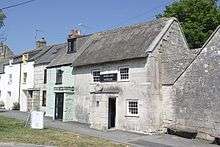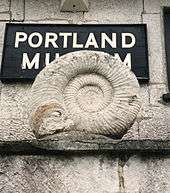Portland Museum, Dorset
Coordinates: 50°32′28″N 2°25′48″W / 50.541°N 2.430°W

Portland Museum is a local museum on the Isle of Portland, and part of the Jurassic Coast in Dorset, southern England.[1] It is located at the southern end of the hamlet of Wakeham, close to Church Ope Cove. The museum is a member of the Dorset Museums Association, whilst the museum and its two cottages have been Grade II Listed Buildings since January 1951.[2]
Overview
The museum is housed in two 17th-century thatched cottages. The museum is built around four distinct themes; the history of Portland Stone, the Jurassic Coast, shipwrecks around Portland, and famous people linked with Portland. It also shows examples of the island's rich archaeology from the Stone Ages onwards.[3]
The museum received 5,925 visitors in 2003, 5,800 in 2004, 4,220 in 2005, 5,517 in 2006, 4,750 in 2007 and 5,209 in 2009.[4] The museum has limited opening times at Easter, and is open every day during the summer (May–September), before reducing to limited opening times until November, when the museum closes until the next Easter.[5]
History

The museum was founded by Marie Stopes. She purchased two derelict cottages at the bottom of Wakeham to create a museum for Portland. She handed the museum to islanders as a gift in 1929.[6][2] Stopes was the Museum's first Honorary Curator and continued a long and active association with it until her death in 1958.[7]
One of the museum's cottages, Avice's Cottage, was the inspiration behind the 1897 novel The Well-Beloved, written by Thomas Hardy, as the home of three generations of "Avices" - the novel's heroines. Hardy was a friend of Stopes.[8]
Features
The Marie Stopes Cottage features a small exhibition about Stopes, and a display of items connected to Thomas Hardy. This area also features a "Victorian Corner" which displays the wedding dress of a local Portland girl, and objects that would have been found in a Victorian parlour. In the upstairs of the cottage, the Maritime Room has a range of artifacts. The Navy on Portland is also highlighted.
The Stone Room highlights Portland Stone, from the quarrying and production to its use on buildings (including war graves) all over the world. The room also features the 'Men of Stone', based on those who worked in the quarries and masonry yards on Portland. The Portland Gallery contains a collection of archaeological finds from excavations, an exhibition about Portland prisons and a cabinet displaying local glass and china items.
The Garden has a collection of local fossils, ammonites, fossilised trees and local masonry and artifacts, including the casing of the famous World War II bomb found on Portland in 1995. The garden also has seating for picnics and refreshments. The museum has a gift shop, whilst plants grown in the local area is offered for sale in the garden.[5]
Makeover

The management of Portland Museum was transferred from Weymouth and Portland Borough Council to the newly formed Portland Museum Trust on 1 April 2008. Today the trust is a registered charity.[7]
From 2009 to present, the museum continues to have a major makeover,[9] whilst the Portland Island Museum Supporters group was established in recent times as an independent and autonomous group, within the ambit of the Portland Museum Trust.[10]
See also
- Jurassica, a proposed theme park on Portland
- Grove Prison Museum, a museum based on the active HM Prison Portland
References
- ↑ "Weymouth and Portland Borough Council". Weymouth.gov.uk. Retrieved 16 February 2013.
- 1 2 Historic England. "Details from listed building database (1206423)". National Heritage List for England. Retrieved 16 February 2013.
- ↑ "About". Portlandmuseum.co.uk. Retrieved 16 February 2013.
- ↑ "Visitor numbers at selected attractions 2002-2011". dorsetforyou.com. 19 October 2012. Retrieved 22 February 2013.
- 1 2 "Weymouth and Portland Borough Council". Webapps-wpbc.dorsetforyou.com. Retrieved 16 February 2013.
- ↑ "Marie Stopes Pictures". Isleofportlandpictures.org.uk. Retrieved 16 February 2013.
- 1 2 "The Museum Trust". Portlandmuseum.co.uk. 1 April 2008. Retrieved 16 February 2013.
- ↑ http://www.geoffkirby.co.uk/Portland/695710/
- ↑ "Portland Museum". Portland Museum. 7 February 2013. Retrieved 16 February 2013.
- ↑ "P.I.M.S.". Portlandmuseum.co.uk. Retrieved 16 February 2013.
External links
- Portland Museum - official site